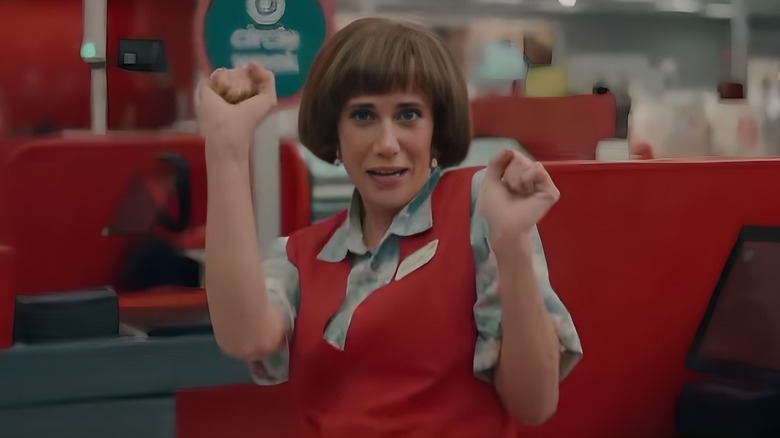Why Kristen Wiig's New Target Commercial Is Making Prince Fans Furious
Target's latest spokesperson happens to be Kristin Wiig's iconic Target Lady character from "Saturday Night Live." She's back in a fresh set of commercials, but fans of legendary musician and notoriously disastrous filmmaker Prince are less than excited. One can hear the musician's "Baby I'm a Star" in the background of the commercial, and it isn't sitting well with those who admire his work.
Fans of the musician congregated on X, formerly known as Twitter, to express their disgust. "Prince did not die for Baby I'm a Star to be on a Target commercial ... I know that estate is not that desperate for money ..." said @BlHistoryQueen, concluding with an expressionless face emoji. "Target got that 'baby I'm a start' X Prince in the latest commercial ... see how they do u? Who getting paid off that?! SMH," said @Q6hPRN. "Prince never intended his art to sell toilet paper. It's sad," observed @JamesJdcxc. @spfarrelltweets encapsulated fan sentiment by saying, "What's next? Applebee's?"
Definitely a different reaction than the one Target received when they licensed Black Pumas' "Colors" for their 2021 "What We Value Most" commercial. While those words might seem a bit harsh on the part of the Purple One's fanbase — after all, Prince had previously partnered with Target to promote the release of his album Lotus Flow3er, even offering the company exclusive songs for their pressings of the album — there's a legal precedent when it comes to the artist's history of keeping a very close eye on his music.
Prince's death opened up the floodgates regarding commercial use of his work
When Prince's fans express distaste for how the musician's estate is handling his legacy, they're really only echoing his concerns about his musical legacy. Anyone who remembers his reaction to the dawning of the internet age would readily agree with that.
Prince was notoriously guarded when it came to the whens and whys of the commercial use of his music and was strongly opposed to the notion of others making money off his image and logos. Notoriously, he sued several fan websites in 2007 for breach of copyright for using images of him. He also tried to sue YouTube and other video-sharing websites for posting his music videos. The suits were later settled in an undisclosed fashion. In 2014, he sued several fans and Facebook itself for $22 million for allowing music lovers to trade bootleg recordings of his live shows; the suit was soon dropped.
Times have changed since the artist's untimely passing in 2016. One can easily find his work on Spotify and view his music videos on YouTube — and that's mainly due to his estate's choices — an estate that's currently embroiled in a legal battle over who ought to be in charge. Some things never change.
